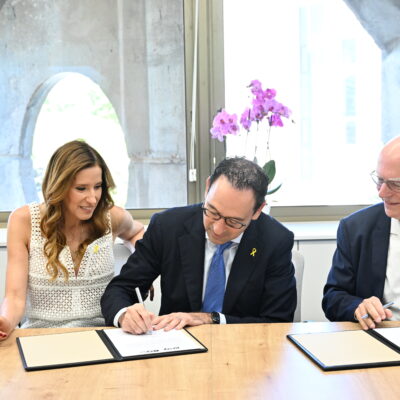How a University Plays a Central Role in Response to a Crisis
by Fran Ginsburg
The Carmel Forest Fire affects a population in northern Israel that has had more than its share of crisis and challenge. Just a few years after the Lebanon War, this current, unprecedented natural disaster has impacted the lives of everyone in the region. Even if they were not personally evacuated or lost loved ones or had their own homes ravaged by fire, all of Israel’s northern population feels the pain and trauma of this ordeal.
At the epicenter of this experience, as in past crises affecting the north, the University of Haifa served and continues to serve as the hub of response activities. The University made its campus, staff, and faculty experts available to national and local authorities, serving as headquarters for the Police, Fire, and Israel Defense Forces as they worked together to battle the blaze and evacuate thousands of people. The University’s campus borders the Carmel Forest, and the administration quickly evacuated 15,000 students and faculty on Thursday with the first indication of the spread of the fire. It then opened its doors and facilities to the authorities who rushed north to help.
Members of the faculty and students were recruited as volunteers. A list of faculty experts in a range of diverse fields, including reforestation, tourism, disaster relief, emergency preparedness, public health, bereavement, and trauma was made available to the authorities to provide expert advice on next steps. The University’s president, Prof. Aaron Ben-Ze’ev, released a statement noting that as the leading institution of higher learning in Israel’s north, the University of Haifa embraces the vitally important role it has to play in assisting the entire region in overcoming the damage and trauma of the last few days – and of the days ahead. Shortly afterwards, faculty members of the School of Social Work were deployed in support of the trauma outreach program hastily organized by the Hof Hacarmel Regional Council, to assist those who were evacuated, lost their homes, and suffered other direct consequences of the fire.
As one can imagine, this fire directly impacted many of the University’s own students and faculty. Sadly, two of the University’s students died in the tragic bus fire. Two more lost their husbands – a police officer and a prison warden. And all three police officers who lost their lives were University alumni. There are also several students who lost family members in the tragic bus fire on Thursday. At least 500 students and faculty live in the towns and kibbutzim that had significant fire damage. Most were evacuated from their homes, and it is not yet known how many may have suffered serious damage to their homes and belongings. All told, there is a large and growing population of people who need both humanitarian aid and psychological support.
Like the rest of Israel, the University is also grappling with a realization of the need for increased fire preparedness. The 30-year-old Eshkol Tower, the tallest building on the Haifa landscape and the central classroom facility on campus, requires urgent upgrading of its fire safety equipment. Buildings and facilities experienced smoke damage, as the fire came to just within 150 meters of the campus at its height. After a frightening and intense few days, the senior University staff is taking stock of the many requests to extend immediate assistance while focusing on the longer-term needs of keeping its students and faculty safe.
The American Society of the University of Haifa is very proud of the University’s exemplary leadership in the face of such an overwhelming crisis. It has remained community-minded, organized, and nimble; all the traits needed to appropriately navigate this kind of catastrophe. Sadly, the University has been through crises before; it will continue to simultaneously lead and rebuild.
If you seeking information about the University, please contact the American Society of the University of Haifa directly at asuh.org or (212) 685-7880.
Fran Ginsburg is the Executive Director, American Society of the University of Haifa.














